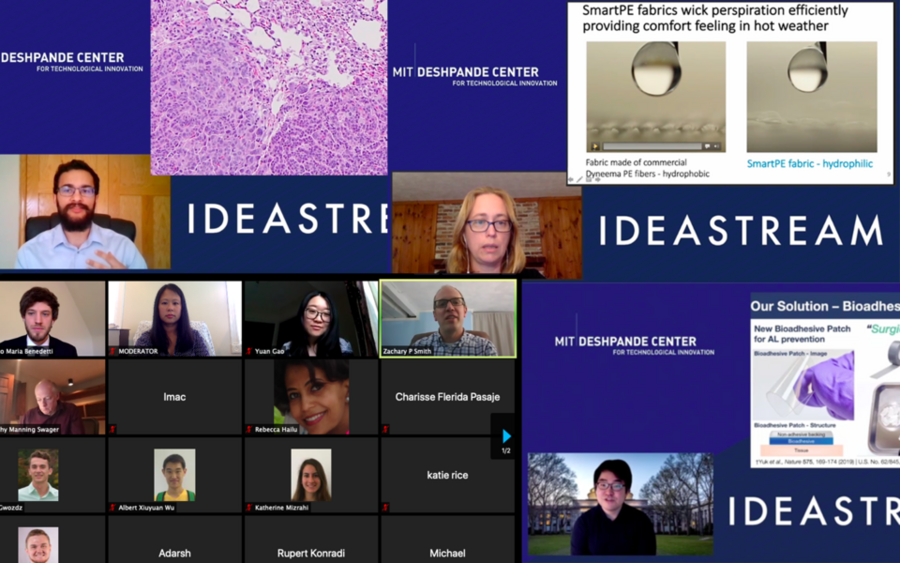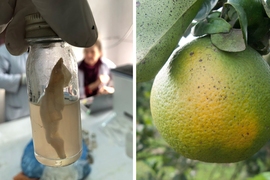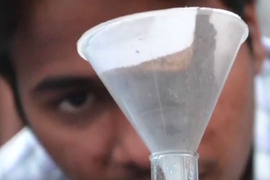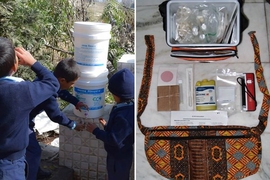MIT’s Deshpande Center for Technological Innovation hosted IdeaStream, an annual showcase of technologies being developed across MIT, online for the first time in the event’s 18-year history. Last month, more than 500 people worldwide tuned in each day to view the breakthrough research and to chat with the researchers.
Speakers from 19 MIT teams that received Deshpande grants presented their work, from learned control of manufacturing processes by Professor Brian Anthony, to what Hyunwoo Yuk of the Xuanhe Zhao Lab colloquially calls “surgical duct tape,” to artificial axons as a myelination assay for drug screening in neurological diseases by Anna Jagielska, a postdoc in the Krystyn Van Vliet Laboratory for Material Chemomechanics.
“Innovation at MIT never stops,” said Deshpande Center Faculty Director Timothy Swager in a welcome address. He underscored how essential it was to keep innovation going, saying the innovation at the heart of the Deshpande Center’s current and future spinout companies will become part of essential businesses to aid in the pandemic.
“These will be key for us … to emerge as a stronger ecosystem, both locally and globally, with different types of innovation,” he said.
A virtual format includes far-flung attendees
IdeaStream is known not only as an exhibition of MIT projects, but as a bridge between academic research and the business community where researchers, faculty, investors, and industry leaders meet and build connections. This year physical distancing prevented in-person meetings, but the conference’s virtual format facilitated thoughtful discussion and introductions and extended IdeaStream’s reach.
Attendees from Greater Boston and as far as Ireland, India, Cyprus, Australia, and Brazil engaged with IdeaStream speakers in Zoom breakout sessions following the presentations. Jérôme Michon, who presented the Juejun Hu Research Group’s work on on-chip raman spectroscopic sensors for chemical and biological sensing, conducted his breakout session from France, to where he returned as MIT closed its campus.
Technology for a better world
Many of the presenters said their projects would have a positive impact on the environment or society. Svetlana Boriskina of the Department of Mechanical Engineering said clothing production is one of the world’s biggest polluters, requiring large amounts of energy and water and emitting greenhouse gases. Her SmartPE fabrics use far less water in production and are made from sustainable materials. The polyethylene fabrics are also antimicrobial, stain-resistant, and wick away body moisture.
Postdoc Francesco Benedetti likewise pointed to the massive energy used for gas separation and purification in the chemical industry, and posed his team’s project as a cleaner alternative. In a collaboration of the Zachary Smith Lab and the Swager Group, they are creating membranes from polymers with a flexible backbone connected to tunable, rigid, pore-generating side chains. They require no heat or toxic solvents for separation, and could replace distillation, saving significant amounts of energy.
Another team has adapted its project to aid in the coronavirus response. Postdoc Eric Miller said that prior to the pandemic, the Hadley D. Sikes Lab had developed immunoassays using engineered binding proteins that successfully identified markers for malaria, tuberculosis, and dengue. Now they have applied that technology to develop a rapid Covid-19 diagnostic test. The paper-based tests would be easily administered by anyone, with results expected within 10 minutes.
Some of the projects addressed food and water challenges and were sponsored by MIT’s Abdul Latif Jameel Water and Food Systems Lab (J-WAFS). Maxwell Robinson, a postdoc in the Karen Gleason Lab, presented an early detection system for Huanglongbing, or citrus greening disease. The incurable disease has cost Florida’s citrus industry $3 billion, and now threatens California’s $3.3 billion industry. The system would identify affected trees using sensors attuned to volatile organic compounds emitted by citrus trees. These compounds change in concentration during early-stage infection, when trees show no visible symptoms.
In another J-WAFS project, Professor Kripa Varanasi of the Department of Mechanical Engineering built on a statistic — only about 2 percent of applied pesticides adhere to their targets — and demonstrated how the drops he formulated help pesticides better adhere to leaves. The result is a drastically lower volume of agricultural spray needed for application, and an overall reduction in chemical runoff.
Taking a chance on early-stage research
Innovation does not come without risk, said Deshpande Center Executive Director Leon Sandler following the event. Much university research is not ready to spin out into companies, and investors won’t put money into it because it’s still too risky.
“By supporting early-stage research with funding, connecting researchers with deep-domain experts who can help shape it, maturing it to a point where it starts to be an attractive investment, you give it a chance to spin out,” he said. “You give it a chance to commercialize and make an impact on the world.
All the presentations may be viewed on the Deshpande Center’s website.









